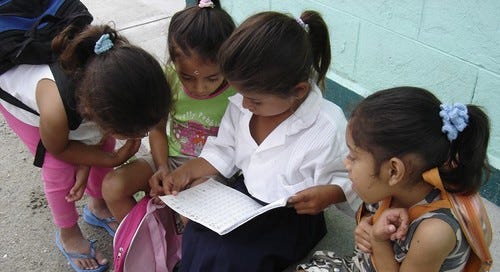Oregon’s Literacy Crisis Begins with our Colleges of Education
The consequences of not being taught to read are all too real for our children. The consequences for higher ed faculty who continue to ignore Oregon’s literacy crisis need to be made just as real.
In the Medford School District, only 44% of third graders are proficient in reading (across Oregon it’s 47%). In December, the Medford School Board wrote a letter to their legislators, asking them to raise “a sense of urgency around the very foundation of education, the teaching and learning of reading.”
Their ask was simple. First, require all Educator Preparation Programs (EPPs) at Oregon colleges and universities to include scientifically-based reading instruction in their required courses. And, second, require all candidates applying for a Preliminary Teaching license in elementary education to pass a rigorous test of research-based reading instruction and intervention, and data-based decision-making principles.
Medford’s board wants these to be requirements, not suggestions, because Oregon ranks last in the country with respect to inclusion of evidence-based literacy instruction in colleges of education.
The U.S. has a literacy crisis, and it begins with how teachers are trained to teach reading in their Educator Preparation Programs (EPPs). According to Education Week,
at least 18 states and the District of Columbia have said that they plan to use COVID-19 relief funding…or previous aid packages to support teacher training or instruction in evidence-based approaches to early literacy. And over the past year, four states have passed new laws or enacted regulations that mandate teachers be taught, and use, techniques that are grounded in the large body of research on how children learn to read.
One of those states is North Carolina, which recently passed a law to retrain every elementary teacher in the state in the science of reading. The NC State Superintendent explains: "The science of reading is not a program. It is a body of research that tells us how the brain learns to read. We are hard-wired to learn how to speak. We are not hard-wired to learn how to read."
Decades of research demonstrates that most students (60%) require a structured literacy approach to become successful readers, and that all students benefit from this approach. The “science of reading” includes a focus on phonological awareness and phonics, but also refers to strategies to help students become fluent readers who understand what they are reading.
North Carolina is training their teachers using LETRS (Language Essentials for Teachers of Reading and Spelling), a program grounded in the science of reading and used by many states, including Mississippi, which passed a similar law in 2013. LETRS is equivalent to two college level courses and prepares teachers to effectively choose, interpret and employ curricula, as well as monitor and evaluate students and identify areas for improvement, including early identification of students who need more intensive interventions.
States are passing legislation not only to retrain teachers already in the classroom, but also to address the teacher pipeline: education preparation programs (EPPs). North Carolina’s law details how the state will hold EPPs accountable for training pre-service teachers in the science of reading.
If higher education faculty in EPPs properly train pre-service teachers, then states will no longer bear the cost of retraining teachers, and districts will be able to focus more resources on coaching and ongoing professional development.
Colleges of Education in Oregon
Portland Public Schools is spending millions to retrain their teachers in LETRS because these teachers did not receive evidence-based reading instruction in their EPPs.
In post-training surveys, 72% of teachers said that in their EPPs, they received “hardly any” or “none” of the content covered in LETRS. Most of these teachers received their degrees and endorsements from Oregon colleges and universities, including Portland State University (PSU), University of Oregon, Lewis and Clark, and University of Portland.
Last May, several PSU students and graduates asked the PSU education department to change how teacher candidates were being taught to teach reading. Many involved in this ask were trained as reading specialists at PSU and discovered that the training they had received was often not based in the science of reading.
After PSU declined to respond, this group held a public forum to voice these issues. A reading specialist in PPS said, “I did not graduate from PSU with the ability or the knowledge to teach reading, writing, or spelling to students of any ability or any grade level.” A PPS Kindergarten teacher said, “I realized, even after graduating with honors, that I was neither equipped nor prepared to teach reading.”
In 2016, forty-seven professors from Oregon colleges and universities signed a letter to the TSPC (Teacher Standards and Practices Commission) stating their opposition to HB2412. This bill addressed the needs of struggling readers by requiring standards for educator preparation programs in early childhood education, elementary education, special education, or reading to include instruction on dyslexia.
Among the professors’ objections to the new law was that it broke “with many years of TSPC practice by mandating particular courses and credits.” In other words, these professors didn’t want to change how or what they were teaching, despite decades of research in the science of reading and worsening reading scores among Oregon’s students.
Change is Possible: Eastern Oregon University
When Dr. Ronda Fritz became an education professor at Eastern Oregon University (EOU), teacher candidates were not receiving adequate training in the science of reading. Over the past few years, she and her colleagues have begun the difficult but essential work of moving away from balanced literacy instruction and designing a course sequence that aligns with the science of reading.
She has also set up reading clinics so that pre-service teachers receive real-world experience teaching children to read. These clinics are based on the DC Reading Clinic, whose mission is to provide research-based structured literacy instruction to readers who struggle, and to provide apprenticeship opportunities for aspiring teachers.
Also, as part of the EOU Reading Clinic, and in partnership with the Oregon Trail Regional Educator Network, Dr. Fritz is training current classroom teachers in the science of reading and working with Reynolds School District and Portland Public Schools to provide college course credit for teachers taking LETRS training.
This collaborative model between EOU’s department of education and school districts can be replicated, but it will require university faculty to be trained in the science of reading and then teach it to their students.
Legislation is Required
When kids aren’t being taught to read and scores haven’t improved for decades, we must examine the causes and players: colleges of education, schools and teachers, and families and students. The American Federation of Teachers (AFT) states, “While parents, tutors, and the community can contribute to reading success, classroom instruction must be viewed as the critical factor in preventing reading problems and must be the primary focus for change.”
If EPP faculty do not believe they play a central role in low reading performance, then what do they think is leading to less than half of students being taught to read—by teachers they trained? Are these college professors satisfied that 53% of our children—the majority of whom are students of color, English learners, and low-income students—aren't being taught to read? Perhaps these EPP faculty believe the problem lies with the learners themselves (kids aren’t trying hard enough, they don’t want to learn, they can’t learn), or perhaps with the families (they don’t value literacy, they don’t read to their kids, etc.)?
Some college faculty may say that children aren’t learning to read because Oregon has a short school year, or because of poverty or something else outside their control. Some may say that they don’t know the evidence supporting the science of reading or that there is no consensus on why reading scores are low. However, it is their job to know the latest research in their fields, and when it comes to early literacy, we are at the point of consensus. Faculty across the state have been made aware of the science of reading through the actions of countless advocates such as those who passed the 2015 dyslexia legislation, and more recently, the teachers who held a public forum to raise the issue about PSU’s program.
Luckily we don’t need to know what these faculty believe because we have research that shows almost all children can learn to read when given proper instruction, and we can look to states and districts that are making changes to achieve gains (e.g. North Carolina and California’s Bonita Unified) based on this research.
Every time a college sends an unprepared teacher into the work force, school districts must spend time and money to retrain that teacher, while countless students suffer from having a teacher who is not trained to meet their needs. Asking college faculty to teach the science of reading is not about academic freedom. It is about accountability and fiscal responsibility, about wasting millions of dollars to retrain teachers (which will be necessary until we change higher ed), and about the unrealized potential of thousands of children.
In 2015, Oregon lawmakers joined parents and teachers to pass legislation to support struggling readers. Oregon legislators must act again and require all Educator Preparation Programs to teach evidence-based practices. The economic and societal costs are too great to politely suggest or recommend that EPPs base their coursework in the science of reading. The legislature must write these standards into law.
Of students who do not meet third grade reading benchmarks, 16% do not graduate from high school, a rate four times greater than for proficient readers. US adults who don’t finish high school have the highest unemployment rates and lowest median earnings. Of children involved with the juvenile justice system, 85% are struggling readers. 70% of inmates in America’s prisons cannot read above a fourth-grade level. Two-thirds of students who cannot read proficiently by the end of fourth grade will end up in prison or on government assistance.
The consequences of not being taught to read are all too real for our children. The consequences for higher education faculty who continue to ignore Oregon’s literacy crisis need to be made just as real.
A guest post by
Jennifer is a literacy advocate with Oregon Kids Read and has worked in finance, academics, and nonprofits. She holds a Ph.D. from the University of Chicago in Philosophy of Religion, and a finance degree from Washington University.
"Kindergarten kids reading" by John Donaghy is licensed under CC BY-NC-ND 2.0








How can we go about getting LTRS for Oregon teachers?
Just spit-balling some ideas.
Has there been advocacy directed at University Board of Trustees? or Faculty Senate?
Raising the concern that the faculty are not working to update and modernize might be 'offensive' to the rest of the academy. Just getting the scrutiny process started from other academics could be helpful.
We cherish the concept of 'academic freedom' at our Universities for many great reasons - yet that freedom also entails a huge amount of responsibility to 'show your work' and justify or give an account of what has been done, what is being done, and what will be done in the future.
Having looked at the impressive list of volunteers at Oregon Kids Read, I would think you could create a very moving and compelling package to send to the Boards of Trustees that you combine with public comments at their meetings. Could be very powerful augmentation to the other great things y'all are doing. https://www.oregonkidsread.com/whoweare